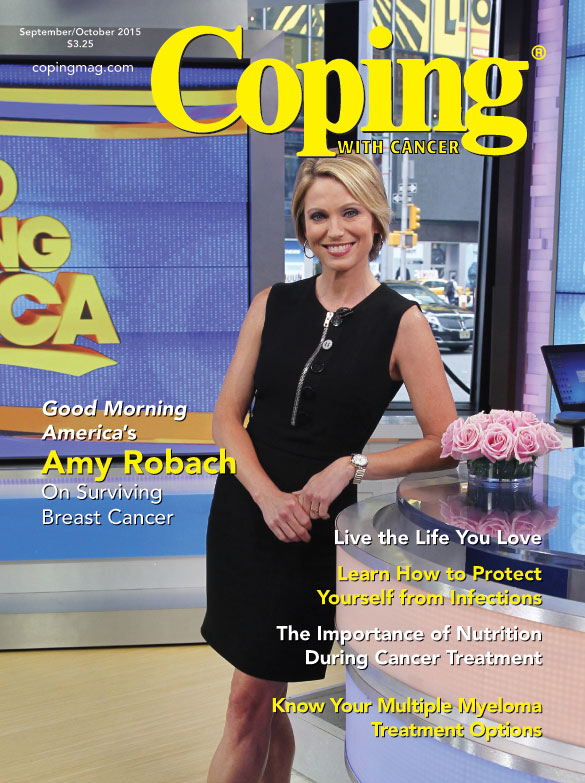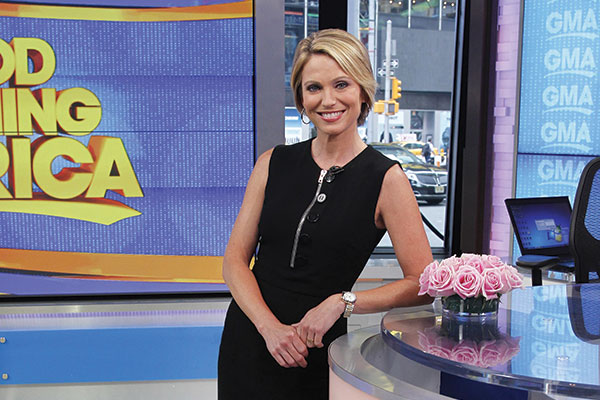Good Morning America’s Amy Robach
On Surviving Breast Cancer, Overcoming Fear, and the On-Air Mammogram that May Have Just Saved Her Life
by Kaylene Chadwell and Laura Shipp
Three years ago, Amy Robach made the move from the host position at NBC’s Weekend Today to take a job at rival network ABC’s Good Morning America. Little did she know at the time that her new job may have helped save her life.
In September 2013, GMA producers approached Amy with the idea of her getting a mammogram live on the show to kick off Breast Cancer Awareness month in October. Amy was 40 years old, had never had a mammogram, and didn’t have a family history of breast cancer. That was the exact demographic GMA wanted to reach.
At first, Amy was hesitant. (After all, who wants their mammogram broadcast live to millions of television viewers?) So she turned to GMA cohost and breast cancer survivor Robin Roberts for advice. Robin encouraged her by saying that if just one life was saved because of early detection, it would be worth it. With that, Amy knew what she had to do.
The Mammogram Broadcast Live to Millions
When the day of her mammogram arrived, like many women, Amy was nervous about the potential pain and physical discomfort it might cause, not to mention the millions of people who would be watching. “I was nervous about how it was going to look having a live camera right there on me as I was getting a mammogram,” she confesses in an interview with Coping magazine. “But more than that, I was worried about whether it would be effective. I didn’t want it to be a distraction to what we were trying to do, which was encourage women to get mammograms and to show that it isn’t that painful or scary.”
The one thing she wasn’t worried about, however, were the results. “I honestly thought it was nearly impossible for me to have breast cancer given my age and my lack of family history,” Amy admits. “Even when I got the call from the mammogram technician saying, Hey, we see something a little suspicious; you should have a follow-up mammogram, alarm bells didn’t go off.”
The Diagnosis that Shook Her World
Still convinced she couldn’t possibly have cancer, Amy kept her breezy composure through a series of follow-up tests, including a second mammogram and a needle biopsy. In fact, cancer was such a remote possibility to her that she even came to her appointments alone. It seemed she had nerves of steel.
I honestly thought it was nearly impossible for me to have breast cancer given my age and my lack of family history.
Then the results came in. The mass in her right breast – the one that was first spotted during her reluctant on-air mammogram – was malignant. Amy was floored.
“I had a visceral, guttural reaction,” Amy shares. “To say I was sobbing is an understatement. There was nothing anyone could have told me that would have been more shocking than that. I didn’t know how to react. My entire world collapsed, and I was there alone. It was absolutely the worst day of my life.”
As soon as they got the news, Amy’s family rallied to her side. But they were just as new to cancer as she was. So the next day, Amy picked up the phone and called the one person she knew would understand. Once again, her friend and colleague Robin Roberts was there to give her the emotional support and the “I’ve been where you are” advice she needed.
Right away, Amy knew she wanted to continue sharing her experience with the public. “I felt a deep responsibility to share my news,” she confides, “because I knew that when women who had watched me go into that mammogram heard I had breast cancer, they would stop making excuses, pick up the phone, and call their doctor to schedule their appointment. I knew for a fact that women’s lives would be saved.”
So just six weeks after broadcasting her first mammogram live from Times Square, Amy revealed her breast cancer diagnosis to the viewers of Good Morning America. Though she did it to help other women, Amy says she feels like she got more in return than what she gave.
“Sharing my journey helped me get through those horrible months of treatment,” Amy says. “I felt the collective love and support of all the other women out there who were struggling with the same thing I was. I felt like I had a whole new set of friends and sisters. And it had a huge impact on my recovery.”
The Grueling Treatments
To rid her body of cancer, Amy opted for a double mastectomy followed by reconstruction. During surgery, her doctors discovered a malignant tumor in her left breast that hadn’t shown up on her prior mammograms. They also found that her cancer had spread to her sentinel lymph node. It was stage II. Now she would need to undergo eight rounds of intense targeted chemotherapy – complete with side effects like fatigue, nausea, and chemo brain – plus a decade-long course of Tamoxifen, of which she’s currently in her second year.
“There’s nothing like turning 40 and then taking a pill and feeling 55,” Amy jokes. “I’m in a constant state of menopause. I have hot flashes and night sweats. [Tamoxifen] basically robs my body of estrogen, because that’s what fuels my cancer. The hope is that by taking this for the next nine years, I give myself the best chance of staving off recurrence.”
On Getting Back to Normal
“The cancer journey doesn’t end the day of your last treatment,” Amy shares. “It stays with you forever, and you figure out how to fight through it each day and live a better life.”
However, two years later, it appears Amy has settled in to her new normal, cohosting Good Morning America and publishing a memoir, though she never really stopped working. She has also made it her mission to speak out about early detection.
She admits, though, that the one thing she hasn’t completely overcome yet is the fear cancer imposes. “I’m working on it,” she says. “But sometimes fear washes over you when you least expect it. I was on a ferry recently, and I saw some grandparents with their grandchildren. All of a sudden, this dark thought entered my head: Will I ever get to be old? Will I ever get to hold my grandchildren?
“Even now I get emotional thinking about it. But I’ve decided that when those moments happen, I’ve just got to cry it out a little bit. Then I can smile and say to myself, But I’m here right now. I’m more aware of how precious time is and how lucky I am to be here. So I’ve been fighting through my fear by using it to remind myself that right now I have everything I need.”

Read Amy Robach’s memoir, Better: How I Let Go of Control, Held On to Hope, and Found Joy in My Darkest Hour, detailing her breast cancer journey and how her illness affected her family and her marriage.
This article was published in Coping® with Cancer magazine, September/October 2015.


